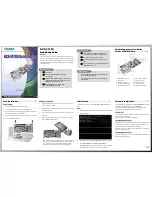
pciGrabber-4x4
122
PHYTEC Messtechnik GmbH 2008 L-720e_0
If whole frames are required, because the resolution should be more
than 288 lines, the Grabber can be instructed to store the frame in one
single memory region. The Grabber automatically will interlace the
two fields. If this option is required, you have to set
nInterlaced
= 1.
Finally the type of image recording, is described: With
nSingleShot
= 0 the Grabber is instructed to digitize continuously.
That means, that after the start continuously digitized information are
stored in the memory in real time (50 fields per sec.). In field mode
(
nInterlaced
= 0) the information is stored to one memory region
(20 ms), then the other region (another 20 ms) alternatingly. This
means, that each field memory region is not accessed from the
Grabber at least for 20 msec.
For frame mode (
nInterlaced
= 1) the Grabber stores continuously to
the common memory, 20 msec the odd and then 20 msec the even
lines.
During the evaluation of the image, it might be disturbing that the
Grabber is just writing new data to the same region, and a mismatch
might occur for fast moving objects. In this case a stop and go
operation is recommended, or digitizing the frames in separate
memory regions which a processed alternatingly.
nSingleShot
= 1 has the effect that only one digitization takes place.
Two fields are taken (one odd one even) or one whole frame. The user
can record the images and with repeated starts new data are stored in
the memory. This mode of operation is recommended, in case only
occasionally images are digitized and no real time application is
required.
In any case, if continuous or single shot grabbing is used:
Set_Image()
configures,
how
the image is recorded. Grabbing is not started with
this function but with the instruction
Start_Grabber()
(
see description
below
).
















































